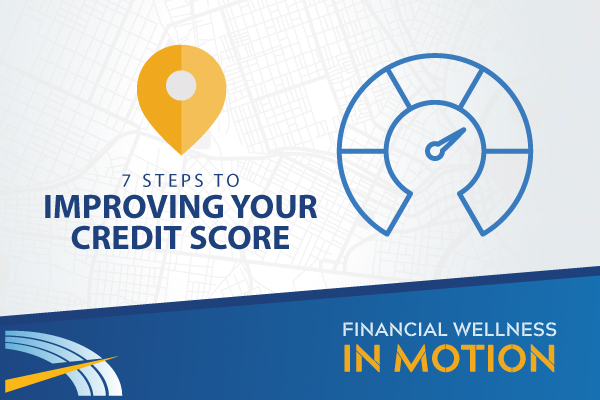
Your credit score is a vital piece of your financial puzzle. Whether you want to save money on a mortgage, apply for a new credit card, or simply gain better financial footing, a strong credit score is your key to success. Here are 7 steps to improve your credit score and open the door to a brighter financial future.

Understand Your Credit Report
Obtain a free copy of your credit report from each of the major credit bureaus – Equifax, Experian, and TransUnion. To get yours, visit annualcreditreport.com. Review each report for errors, inaccuracies, or fraudulent activity. Dispute any discrepancies promptly to ensure an accurate representation of your credit history.

Pay Your Bills on Time
Consistently paying your bills on time is one of the most significant contributors to a positive credit score. Set up reminders or automatic payments to ensure you never miss a due date. Even one overdue payment can harm your credit.

Manage Your Credit Utilization
Credit utilization, or the ratio of your credit card balances to your credit limits, plays a crucial role in your credit score. Aim to keep your credit utilization below 30% to demonstrate responsible credit management. Pay down existing balances and consider increasing your credit limits to improve your rate.

Diversify Your Credit Mix
Having a diverse mix of credit accounts can boost your credit score. This includes a combination of credit cards, installment loans (e.g., auto loans, student loans), and retail accounts. However, only take on new credit if it aligns with your responsible financial goals.

Avoid Opening Too Many New Accounts
While a diverse credit mix is beneficial, opening multiple new accounts within a brief period can raise lender concerns. Each new application generates a hard inquiry on your credit report, which can slightly lower your score. Be strategic and only apply for credit when necessary.

Do Not Close Old Accounts
The length of your credit history matters. Closing old accounts can shorten your credit history and may impact your credit score. Even if you no longer use a credit card, consider keeping it open. Especially if it has a positive payment history.

Work to Settle Outstanding Debts
If you have outstanding debts in collections, consider working with creditors to settle these accounts. A paid-off collection account is viewed more favorably than an unpaid one, though it may still appear on your credit report.
We’re Here to Help
Remember, every positive action you take today contributes to a brighter and more secure financial future tomorrow. Improving your credit score requires patience, discipline, and a proactive approach to managing your financial obligations. By understanding the factors that influence your credit score and taking deliberate steps to strengthen it, you can unlock a world of financial opportunities and pave the way toward achieving your long-term goals. Visit transfcu.org for help achieving your financial goals and dreams.


